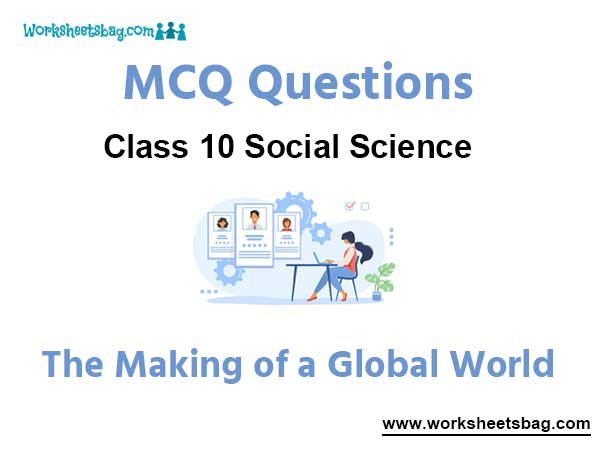Please refer to The Making of a Global World MCQ Questions Class 10 Social Science below. These MCQ questions for Class 10 Social Science with answers have been designed as per the latest NCERT, CBSE books, and syllabus issued for the current academic year. These objective questions for The Making of a Global World will help you to prepare for the exams and get more marks.
The Making of a Global World MCQ Questions Class 10 Social Science
Please see solved MCQ Questions for The Making of a Global World in Class 10 Social Science. All questions and answers have been prepared by expert faculty of standard 10 based on the latest examination guidelines.
MCQ Questions Class 10 Social Science The Making of a Global World
Question. The Great depression happened during the period
(a) 1929- 1930s
(b) 1929-1940s
(c) 1929- 1950s
(d) 1929- 1960s
Answer
A
Question. The IMF and the World Bank commenced financial operations in
(a) 1944
(b) 1945
(c) 1946
(d) 1947
Answer
D
Question. Henry Ford developed his new car plant at
(a) Cleveland.
(b) Las Vegas.
(c) Detroit.
(d) Pittsburg.
Answer
C
Question. The country of Asia that retreated to isolation in 18th century was
(a) India.
(b) Japan.
(c) China.
(d) Indonesia.
Answer
C
Question. In IMF and World Bank, the decisions are taken by
(a) developing nations.
(b) a joint council of developed and developing nations.
(c) western industrial powers.
(d) least developed nations.
Answer
C
Question. The Bretton Woods system was based on the
(a) fixed exchange rate.
(b) NSY exchange rate.
(c) BSE exchange rate.
(d) National Exchange Rate.
Answer
A
Question. Trade with American continents developed in the
(a) 14th century.
(b) 15th century.
(c) 16th century.
(d) 17th century.
Answer
C
Question. Railways were developed to link ports with
(a) industries.
(b) forest regions.
(c) agricultural regions.
(d) plantations.
Answer
C
Question. To escape religious persecution, the people of Europe fled to
(a) Africa.
(b) Australia.
(c) America.
(d) Asia.
Answer
C
Question. Rinderpest arrived in Africa in
(a) 1860s.
(b) 1870s.
(c) 1880s.
(d) 1890s.
Answer
C
Question. The Second World War was fought during
(a) 1919-1925.
(b) 1939-1945.
(c) 1945-1951.
(d) 1929-1935.
Answer
B
Question. In the plantations developed in America, the two chief crops grown were
(a) peanuts and sugar beet.
(b) sugarcane and cotton.
(c) rubber and coffee.
(d) tea and coffee.
Answer
B
Question. The number of ‘flows’ identified by the economists in the international economic exchanges was
(a) four.
(b) three.
(c) two.
(d) one.
Answer
B
Question. Globalisation refers to
(a) a political system.
(b) a social system.
(c) an economic system.
(d) a cultural system.
Answer
C
Question. Pasta was taken by Arab traders to
(a) Germany.
(b) China.
(c) Spain.
(d) Sicily.
Answer
D
Question. Sicily at present is a part of
(a) Germany.
(b) Italy.
(c) Spain.
(d) Britain.
Answer
A
Question. The region that played a crucial role in the trans-oceanic trade between Asia, Europe and America was
(a) Maldives.
(b) Indian subcontinent.
(c) Africa.
(d) Indonesia.
Answer
C
Question. The Americas was discovered by
(a) Vasco Da Gama
(b) Christopher Columbus
(c) Fa Hien
(d) Americo vespucci
Answer
B
Question. The city that had bee named as the Fabled City of Gold was
(a) New York
(b) Pretroika
(c) El Dorado
(d) New Jersey
Answer
C
Question. In America, the mines of silver have been found in
(a) Columbia and Sao Gabile.
(b) Hawaii and Alaska.
(c) Panama and San Francisco.
(d) Peru and Mexico.
Answer
D
Question. Large number of people in Europe, died in 1840s due to a disease, which destroyed the
(a) soya crop.
(b) maize crop.
(c) beet crop.
(d) potato crop.
Answer
D
Question. The pre-modern world shrank due to the discovery of
(a) sea route.
(b) iron.
(c) steam engine.
(d) America.
Answer
A
Question. The most powerful weapon used by the Spanish conquerors for colonization of America was
(a) nuclear weapons
(b) chemical bombs
(c) germs of Smallpox
(d) special artillery
Answer
C
Question. ‘Hosay’ refers to a
(a) riotous carnival
(b) riligious function
(c) marriage ceremony
(d) musical concert
Answer
A
Question. The First World War was fought during
(a) 1914- 1918
(b) 1919- 1921
(c) 1920- 1925
(d) 1925- 1932
Answer
A
Question. A bonded labourer under contract to work for an employer for a specific amount of time, to pay off his passage to a new country or home is known as
(a) indentured labour
(b) slave
(c) migrated labour
(d) free labour
Answer
A
Question. The main demand of the group- Group of 77 was
(a) to change the exchange rate system
(b) to fix Australian dollar to be exchanged with gold
(c) to have a more fair system of decision making at the IMF
(d) to have a new international economic order
Answer
D
Question. The US became a colonial power in the late 1890s by taking over some earlier colonies of
(a) Spain
(b) France
(c) Portugal
(d) Germany
Answer
A
Question. The ‘flows’ within international economic exchanges that are identified by the economists are
(a) flow of bullions, sea food and capital
(b) flow of trade, labour and capital
(c) flow of silk, slaves and capital
(d) flow of capital, productive techniques and silk
Answer
B
Question. The first governor of Massachusetts Bay colony in New England was
(a) John Winthorp.
(b) James Windslay.
(c) Alfred Crosby.
(d) M.W. Ridley
Answer
A
Question. The author of Ecological Imperialism is
(a) James Widslay.
(b) John Winthorp.
(c) Alfred Crosby.
(d) M.W. Ridley
Answer
C
Question. During 1845 to 1849, the Great Potato Famine spread in
(a) Ireland.
(b) Scotland.
(c) Finland.
(d) Britain.
Answer
A
FILL IN THE BLANKS
Question. It is believed that noodles travelled west from China to become __________.
Answer
Spaghatti
Question. Many expeditions set off in search of __________ , the fabled city of gold.
Answer
EL Dorado
Question. In the big European powers met in to __________ complete the carving up of Africa between them.
Answer
1885, Berlin
Question. In Africa, in 1890, a fast spreading disease of cattle plage or __________ had a terrifying impact on people’s livelihood.
Answer
Rinderpest
Question. __________ music, is a creative contemporary expression of the post indentured experience in Trinidad and Guyana.
Answer
Chutney
TRUE / FALSE
Question. During the first world war Allies-Britain, France and Russia fought against the central powers – Germany, Austria-Hungary and Ottoman Turkey.
Answer
True
Question. The IWW transformed the US from being an international creditor to an international debtor.
Answer
False
Question. The assembly line forced workers to repeat a single task mechanically at a pace dictated by the coveyer belt. T
Answer
True
Question. The Great Depression began around 1914 and ended till the mid 1930s.
Answer
False
Question. The famous economist John Maynand Keynes thought that Indian gold exports promoted global economic recovery.
Answer
True



